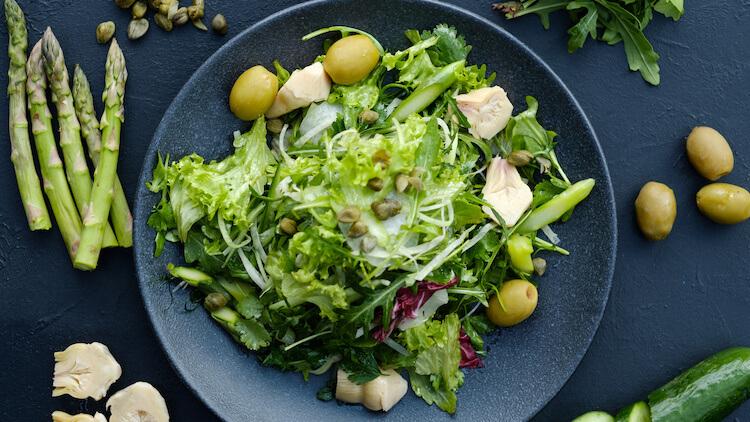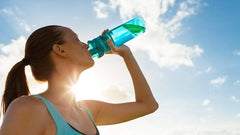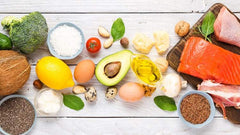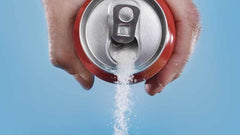
Negative Calorie Foods - Can You Eat Them And Not Gain Weight?
In recent years, we’ve seen diet plans come into vogue and then sort of fade away like fashion. Negative calorie foods are the latest in a list of dieting methods that fitness gurus are suggesting. The short of it is, negative calorie is supposed to have a net weight loss effect since they require more calories to digest than they themselves contain. Although a theoretically plausible claim to make, there is no such thing as a “negative calorie” food. Negative calorie foods are a myth and so are negative calorie food recipes.
What Are Negative-Calorie Foods?
Before we can discuss negative calorie foods, it’s important that we understand some key concepts underpinning the idea.
Some Basic Concepts
Calories are the amount of energy contained in any type of food. Excess energy or calories are converted into something called “adipose tissue” which can then be reconverted into calories to help keep the body going. This is what body fat really is, it’s a store of calories.
The human body uses energy to digest food. It is a minimal amount of energy that’s required to digest food entirely. This is a fact about the human body and is also the key principle that contributes to the popularity of negative calorie diets.
Negative Calorie Foods
As we mentioned before, negative calorie foods are those that require more energy to digest than they themselves contain. These include vegetables with high water content and low levels of carbohydrate composition such as celery, watermelons, and similar fruits and vegetables. The difference between the energy provided and the energy required to digest them makes them a work-out in itself.
So for example, if a stick of celery contains 7 Kcal, and takes 8Kcal to digest; then well you lose 1 Kcal worth of fatty tissue when you eat. As the celery fills your appetite, you won’t even be starving yourself as you go through the diet.
This is at least how negative calorie foods work in principle.

Important Question: Are Negative Calorie Foods actually Negative Calorie?
As much as we’d like it to be true, there’s no such thing as a negative calorie food. Although the principle makes sense, anyone who says that negative calorie foods exist is overstating the amount of energy required to digest food.
The actual amount of energy required to digest any of the macronutrients (Proteins, Carbohydrates and Fats) is a percentage of the total calorie count in the food itself. Typically, these percentage measurements are:
- 20-30% calories in proteins go into digesting them.
- 5-10% calories in carbohydrates go into digesting these.
- 0-3% of calories in fats goes into digesting these.
So you’d still be left with a fair bit of excess calories in any type of food you eat. These will then be stored as excess fat or used up in bodily processes, however that may go. So whether you eat a celery stick or some watermelon, there’s no way that you will actually lose weight when you eat these.
Just because there’s no such thing as a negative calorie food, that doesn’t mean you can’t eat the very same food to help you lose weight. Whether or not these types of food have a negative net effect for your body, foods referred to as negative calorie foods, still have a very low-calorie count. As such, they’re very nutritious and can significantly reduce the amount of weight gain you’ll experience.
You’ll find that low-calories foods like oats, celery, lemons and other similar food items have higher concentrations of dietary fibre, amino acids and other basic nutrients required for nourishment.
Weight Loss Benefits of Low-calorie Foods
Since adipose tissue is made out of excessive calories, there are some very obvious benefits of eating low-calorie foods for weight loss. Because foods do not have a lot of calories in them in the first place, there’s very little fat that can be made out of these. As you shift your eating habits to include low-calorie foods, you’ll observe that you have already begun to lose weight.
Much of this effect is apparent in people who make a drastic shift to low-calorie foods. Assuming that you maintain that same amount of activity throughout the day, shifting to a low-calorie diet will make your body expend more fats than it did before to keep you going. Your weight will fall until it tapers off to a point where the calories you’re taking are no longer excessive nor too little. It’ll be the exact amount you need to function.
Besides the potential for weight loss, low-calorie foods have high compositions of basic nutrients that your body needs to keep functioning. Most low-calorie foods like fruits, vegetables and sea food have high concentrations of:
- Essential vitamins and minerals
- Amino Acids
- Fatty Acids
- Dietary Fibre
- Essential Sugars
- Protein
- Carbohydrates
View this post on Instagram
What low-calorie foods you should eat
When you go through this list and compare it to other places talking about negative calorie foods, you’ll see that these are all the same names as in the negative calorie food list. The fact of the matter is, negative calorie foods are actually low-calorie foods.
Even if they aren’t negative calorie foods, these are still some of the healthiest food options that you have. Some low-calorie foods you should eat include:
Celery
Celery is always a healthy snack if you’re looking to munch on something without the weight gain. Most of the mass in a celery stick is its water content and as such doesn’t contribute much to weight gain.
The nutritional composition for raw celery is as follows:
- 16 Calories
- 0.2 grams of fats which include minute levels of saturated fatty acids, monounsaturated fatty acids and polyunsaturated fatty acids.
- High amounts of potassium, calcium, magnesium and sodium.
- 0.69 grams of proteins
- 2.97 grams of carbohydrates
- 1.6 grams of fibre
- 1.34 grams of sugar
Each of the nutrients contained in celery are basic nutrients that do not even require much processing by the digestive system. It moves really fast through your body and these nutrients are much more readily absorbed into your bloodstream.
Berries
Compared to celery, berries like blackberries, strawberries and the like are actually a very tasteful addition to your diet. These fruits are generally very high in sugar content and rich in vitamins that make them immensely nutritious.
In addition to this, berries have been known to prevent conditions like cardiovascular disease, cancer and act as anti-oxidants which can relieve inflammation as well as skin conditions.
The nutritional breakdown for berries is as follows:
- 61.9 Calories, a majority of which come from carbohydrates than proteins and fats.
- 7.6 grams of dietary fibre
- Traces of Monounsaturated fats and polyunsaturated fats. As well as 135mg of Omega-3 fatty acids and 268mg of Omega-6 fatty acids.
- The fruit is high in vitamins A, C, E and K.
- Berries are also high in concentrations of essential minerals like calcium, magnesium, phosphorus and potassium.
- Most of the mass is water mass.
Grapefruit
This citrus fruit is actually one of the best sources for Vitamin C. The vitamin is an essential part of calcium absorption in the body and help boost the nervous system. Eating grapefruits is actually one of the most holistic wellness steps you can take considering the range of benefits from eating the fruit.
Here is a somewhat in-depth nutritional profile for grapefruits:
- 44mg of Vitamin C
- 59mg of Vitamin A
- 1.4g of dietary fibre.
- 178mg of potassium
- 10.34g of carbohydrates
- 0.13g of fats
- 0.81g of proteins
- 40.96 calories
The calorie count is actually a mark of how energizing the fruit really is. Considering its high water content, grapefruits are a great way of staying hydrated while enjoying the immense nutritional benefits without gaining much weight.

Carrots
For something that’s so small, a carrot is packed with a lot of nutritional value. It can help with the production of new blood, contributes to the healing abilities of the body and is an effective anti-oxidant.
Carrots are generally very rich in vitamins and fibre, which can help avoid various gastrointestinal disorders and boost the immune system.
The nutritional profile for carrots is as follows:
- 1.13g of protein.
- 11.69g of carbohydrates.
- 0.29g of fat.
- 3.42g of dietary fibre.
- 1.20mg of Vitamin B3.
- 7.20mg of Vitamin C.
- 1019.07 micrograms of Vitamin A.
- High concentrations of minerals like Calcium, phosphorus, potassium and sodium.
Including carrots in your salads or having them as part of a meal makes for a very wholesome addition to eating habits.
Tomatoes
Many people don’t know this, but tomatoes are actually a fruit and not a vegetable. This low-calorie food has high concentrations of Vitamin A and Vitamin C, along with minerals which are essential for cell development.
Given below are some nutritional facts about tomatoes, as found in a single serving:
- A calorie count of 26.8, majority of which comes from carbohydrates.
- 1.8 grams of dietary fibre.
- 4.5mg of Omega-3 fatty acids and 119mg of Omega-6 fatty acids.
- The fruit is rich in vitamins C, K and iron with concentrations of 18.9mg, 11.8 mcg and 22.3 mcg respectively
- High concentration of calcium at 14.9mg, 16.4 mg of magnesium, 353mg of potassium and 3.4mcg of fluoride.
- The fruit has 141g of water per serving.
Cucumbers
Cucumbers are also another low-calorie and high nutrition food option. A single cucumber, weighing 52g, has the following nutrition profile:
- 83% Carbs, 6% fats, 11% protein
- 7.8 calories per serving
- 1.9g of carbohydrates, including 0.3g of dietary fibre and 0.9g of sugar.
- 2.6mg of Omega-3 Fatty acids and 14.6mg of Omega-6 Fatty Acids
- 0.3g proteins
- High concentrations of Vitamins C and K at 1.5 and 8.5g respectively.
- High concentration of mineral metals like calcium, magnesium, phosphorus and potassium.
- 49.5 grams are just water weight
Watermelon
Watermelons are mostly just water content really; they contain high concentrations of sugar and are a very refreshing treat on a hot summer day.
The major nutritional facts about watermelons are as follows:
- The fruit is 89% Carbs, 4% fats and 7% proteins.
- Watermelons have a total of 46.2 Calories
- 9.5g of sugars and 0.6g of dietary fibre.
- 77mg of Omega-6 fatty acids
- High concentrations of choline, folate and vitamin C at 6.3mg,4.6mcg and 12.5mg
- High concentrations of Calcium, Magnesium, Phosphorus and Potassium at 10.8mg, 15.4mg, 16.9mg and 173mg respectively.
- A 154g serving is actually 152g of water.
Apples
You know what they say; an apple a day, keeps the doctor away. The fruit is a great source of energy and is high in iron content. The apple peel also contains high concentrations of essential minerals and vitamins.
Some nutritional facts for apples are as follows:
- The fruit is 95% Carbs, 3% Fats and 2% proteins.
- It contains 65.0 Calories.
- 3g of Dietary fibre and 13g of sugar.
- It contains 11.2mg of Omega-3 Fatty Acids and 53.8mg of Omega-6 Fatty Acids.
- A 125g serving of apples contains 5.7g of vitamin C, 2.8mcg of Vitamin K and 3.8mcg of Folate.
- The fruit contains high concentrations of Calcium, Iron, Magnesium and Phosphorus.
- A 125g serving of apples will be 107g water.
Zucchini
Although not the best tasting vegetable in the list, zucchinis are a core component of any healthy meal plan. The vegetable contains the following nutrients:
- The vegetables contain 19.8 calories
- A total carbohydrate mass of 4.2g, of which 1.4g is dietary fibre and 2.1g are sugars
- 58.3mg of Omega-3 fatty acids and 34.7mg of Omega-6 fatty acids.
- High concentration of vitamin C, K and folate.
- 18.6g of Calcium, 21.1 magnesium, 47.1 mg of phosphorus, 325mg of potassium and 12.4mg of sodium.
- In a 124g serving of zucchinis, 117g are water.
Broccoli
Broccoli changes its nutritional value, depending on whether you eat it raw or boiled. Therefore the nutritional facts are also going to be different. If you include broccoli in your meals, then you need to know the nutritional values dependant on how you choose to add it:
Cooked Broccoli:
- The vegetable contains 96 calories.
- 9.2 grams of dietary fibre and 3.9 grams of sugar.
- It contains 333mg of Omega-3 fatty acids and 143mg of Omega-6 fatty acids.
- It also includes high concentrations of vitamin C at 182mg, 395 mcg of Vitamin K and 112 mg of choline.
- Broccoli is also high in Calcium, Magnesium, Phosphorus, Sodium and Flouride.
- A 280g serving of boiled broccoli contains 250g of water.
Uncooked Broccoli:
- When eaten raw, the vegetable contains 30.9 calories
- 2.4g of dietary fibre and 1.5g of sugars
- 19.1 mg of Omega-3 fatty acids and 15.5mg of Omega-6 fatty acids
- 81.2mg of Vitamin C, 92.5 mcg of vitamin K and 57.3mcg of folate.
- Uncooked broccoli has higher percentages of mineral metals.
- A 91g of uncooked broccoli is essentially 90% water.

Lettuce
Lettuce is a crispy, light snack when you feel like munching in the middle of the day. Your average serving of lettuce, weighing 72g has the following composition:
- 10.1 Calories
- 1.4 g of sugars and 0.9g of dietary fibre.
- 37.4mg of Omega-3 fatty acids and 15.1mg of Omega-6 fatty acids
- High concentration of vitamin K
- High concentrations of calcium, phosphorus and potassium.
- The total weight of water in the serving will be 68.9g.
Conclusion
All negative calorie foods are simply low-calorie foods. Even if you don’t lose weight eating these, it shouldn’t have to mean that you simply let these go altogether. Fruits and vegetables are some of the best sources of lean proteins, carbohydrates and useful fatty acids.
When you combine these foods with regular exercise, this combination is one of the surest ways of shedding weight and living a long and wholesome life.
PhenQ manufactures natural weight-loss supplements that you can use to expedite your weight loss treatments. In addition to this, we also offer advice on the best ways that you can lose weight and maintain your health. Visit our website today for more information on our weight loss products or to read out articles on how to live a healthy lifestyle.




